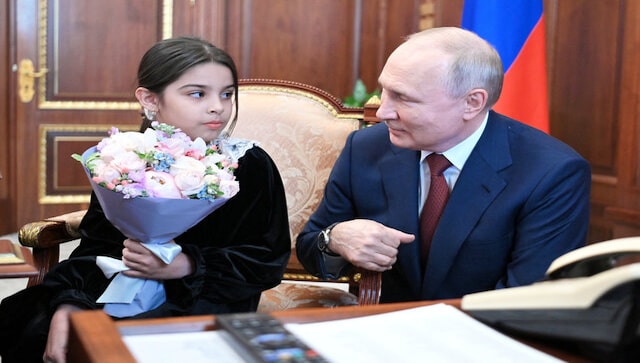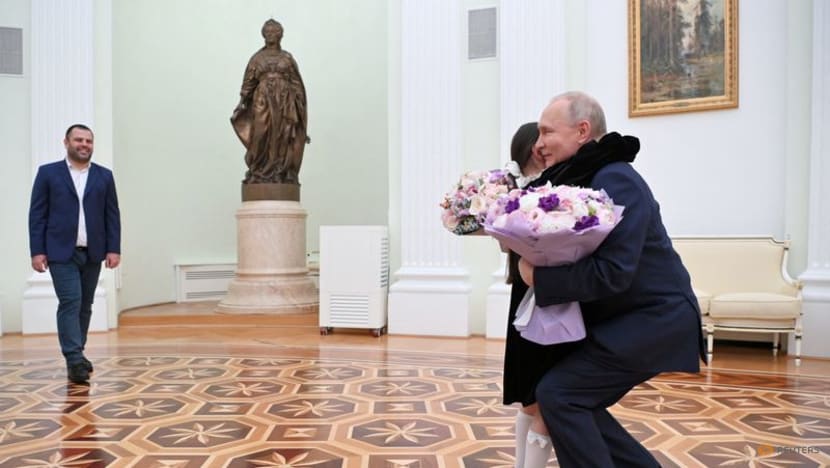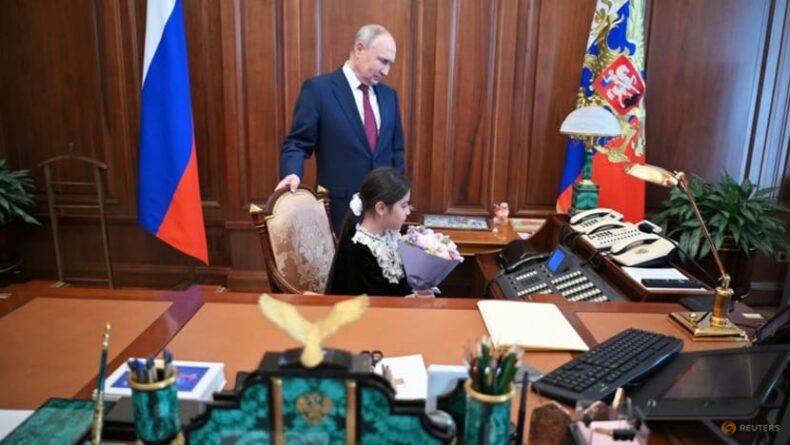In an unexpected move, Russian President Vladimir Putin recently hosted an eight-year-old girl, Raisat Akipova, in the Kremlin. This peculiar event took place amidst the backdrop of the apparently armed mutiny by the Wagner Group mercenaries in June. The encounter involved Putin making a call to his finance minister, Anton Siluanov, in the presence of Raisat, requesting additional budget funding for her home region. The Kremlin shared a video of this interaction, which garnered significant attention worldwide.

A Warm Welcome in the Kremlin
The videotape released by the Kremlin captured the gladdening moment when Putin ate youthful Raisat Akipova to the Kremlin. The Russian President sounded amused during the discussion, which also included a call to Prime Minister Mikhail Mishustin. Raisat, holding a bouquet of flowers, thanked Finance Minister Siluanov when urged by Putin. The President explained that he’d invited Raisat and her parents to Moscow because he was worried after seeing a picture of her in gashes when she failed to see him during his visit to Dagestan.
An Extraordinary Request for Budget Grant
During the phone call with Finance Minister Siluanov, Putin made a surprising request for fresh backing for Raisat’s region. originally bemused, Siluanov snappily agreed to the President’s request. Putin responded with enthusiasm, blurting,” Excellent!” He also informed Raisat that they had secured 5 billion roubles( roughly$55.6 million) for Dagestan, her home region. This significant entitlement will really have a substantial impact on the development and weal of the impoverished southern region of Russia.
Dagestan: A Region with Unique Challenges
Dagestan, located in southern Russia, has long been recognized as one of the country’s poorest regions. The draft statistics reveal that the region has contributed a significant number of conscripts to the Russian armed forces since the start of the war in Ukraine. Despite its economic struggles, Dagestan has played a crucial role in bolstering the armed forces during this period of unrest.
Putin’s Visit to Dagestan
The President’s assignment to Raisat and her parents to Moscow came as an effect to his recent visit to Dagestan. During this visit, Putin engaged with a large crowd of people, which was largely unusual for him. The Kremlin stressed this event as substantiation of the President’s” astounding” support in Russian society, particularly in light of the recent insurgency by the Wagner Group mercenaries. Putin had preliminarily advised of the threat of civil war in Russia, further fueled by this fortified group’s conduct.

Protests Against Conscription
In contrast to the support shown during Putin’s visit, Dagestan has witnessed protests against conscription in the past. Last year, videos on social media depicted women in Dagestan chasing police away from a rally, expressing their opposition to conscription. The capital city, Makhachkala, witnessed large anti-war demonstrations, with protesters holding placards and shouting “No to war.” The clash between protesters and riot police resulted in the arrest of over 2,000 anti-war protestors.
Distribution of Conscripts and Poverty Rates
Investigative journalists in Russia reported last year that regions with higher poverty rates were mobilizing a larger share of conscripts to be sent to Ukraine. With its high poverty rate, Dagestan recruited approximately 2.6% of its reservists during the initial drive to boost troop numbers. This finding sheds light on the challenges impoverished regions face and their contribution to the ongoing conflict in Ukraine.

Avoiding Civil War: The Failed Wagner Coup
On June 25, 2024, Putin addressed the nation, assuring them that a bloody civil war had been averted following the “failed” Wagner coup. The Wagner Group, known for supporting Russian armed forces, had marched towards Moscow that weekend. Yevgeny Prigozhin, the leader of the group, called off the surge in order to prevent Russian bloodshed. He claimed that the uprising was a protest against the ineffective conduct of the war in Ukraine. Prigozhin’s clashes with senior officials in Russia’s armed forces, despite their joint efforts in Ukraine, have been well-documented.
Conclusion
The Kremlin’s decision to showcase Putin’s interaction with eight-year-old Raisat Akipova in the midst of a political and military crisis has captured global attention. This unusual event, characterized by a call to the finance minister for budget funding, highlights the challenges impoverished regions like Dagestan face. As Russia grapples with internal and external conflicts, it is crucial to recognize the impact of such interactions and decisions on the country’s socioeconomic landscape. The story of Putin and Raisat serves as a reminder of the complex dynamics at play in Russia’s political and military spheres.













